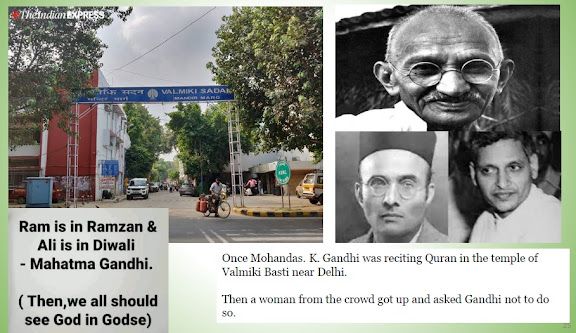Action is Superior to Inaction
Arjuna said:
If you consider Knowledge as superior to Action, why
then do you urge me to this dreadful action of killing our relatives and
venerable Gurus?
By seemingly conflicting words, you are confusing my
mind.
Tell me only about that which definitely lead to my
highest good.
Lord Krishna said:
By merely abstaining from action, one cannot achieve
freedom from the bondage of action.
Further, no one can remain inactive even for a moment.
Everyone is driven to action by the forces of Nature.
He, who controls all sense organs, but dwells in his mind on the objects of the
senses, is called a hypocrite.
On the other hand, a person excels by controlling the
sense organs by the power of the will, remaining unattached and also engaging
the organs of action. Such actions are called yoga of action.
Man does not attain actionlessness stage by abstaining
from action. Again man does not also rise to perfection by mere renunciation.
Therefore, perform your allotted duty. For,
action is superior to inaction. By desisting from action, you cannot even
maintain your body.
(Main References: Ch.3 – stanzas
1,4,5,6,7,8)
Comments:
Yoga of Knowledge is inward looking.
Yoga of action is outward looking.
Thoughts duly controlled by mind are the
source of power and energy for yoga of knowledge.
Works by the body – senses in particular
duly controlled by mind are the source of power and energy for yoga of action.
Knowledge leads to sanyasa –renunciation.
Action leads to tyaga – sacrifice. Knowledge in its final stage becomes
actionlessness.
Action in its final stage becomes perfect
or pure action.
A man practicing Yoga of knowledge can cure
or curse without any space constraint.
Such Yogis are capable of inflicting their
benevolence without any movement of the body. But Karma Yogi has to go
physically to accomplish his task. For both of them, their measures of
successes or failures depend upon the effectiveness or otherwise of their
controls over their minds.
Still, Lord Krishna declares that action is
superior to knowledge. This is because that action is unavoidable and that all
those with bodies will be forced to perform action by the Nature.
A common denominator for both Jnana Yogi as
well as Karma Yogi is action – but minimum to the former.
Path of Knowledge is more or less – ‘no
action’ and there is every possibility of this ‘no action’ state being misused
by many who keeps ‘idle’ posing themselves as Jnana Yogis.
Path of Action, which has no such
misconception, is superior.




Comments